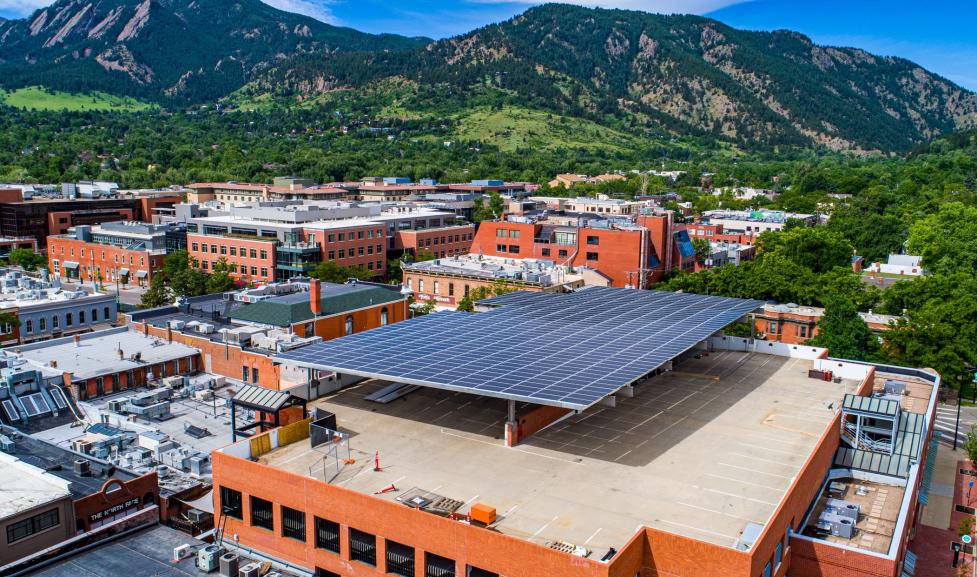Achieving Energy Efficiency in City Buildings
Preserving the health and sustainability of our climate has been valued by the Boulder community for many years. It is important that the city leads by example and does its part to reduce the community's energy consumption and GHG emissions .
The city Facilities and Fleet division continuously evaluates strategies to meet the energy needs of the city organization at the lowest cost, including conservation, energy efficiency and renewable energy. Facilities and Fleet's general policy is to complete energy-saving projects that have a payback of five years or less and to purchase hybrid and high-efficiency vehicles, where possible. The Energy Performance Contract (EPC) completed in 2013 included energy-efficient indoor and outdoor lighting, occupancy sensors that control lighting, and HVAC system upgrades. The new HVAC and lighting systems use less energy and are designed to last longer.
Solar Thermal Systems
Solar thermal systems at the East and South Boulder recreation centers to help offset the cost of heating the swimming pools. The two systems will save the city $14,657 per year and reduce annual carbon emissions by more than 125 tons. When it was installed in 2002, the solar thermal system at the North Boulder Recreation Center was one of the city’s largest solar power systems.
Solar Electric Systems
Solar electric systems offset a portion of city facilities' electric consumption and reduce the load on the community's electric grid. The collective electric output of the systems is more than 1.4 million kilowatt-hours per year. A combination of decreased electric costs and renewable energy credits will save the city $162,655 per year and reduce annual carbon emissions by more than 1,233 tons.
Donated Solar Electric Systems
The solar electric systems at the George Reynolds Branch Library, Park Central building, and Municipal building were donated to the city in 2008. Bella Energy donated and installed the library's solar electric system, while anonymous donors funded the systems at the Park Central and Municipal buildings through the Center for ReSource Conservation (CRC).
During the past four years, the one-megawatt solar photovoltaic system at the city's Wastewater Treatment Facility has generated more than six million kilowatt-hours of electricity, saving utility ratepayers more than $200,000. The system began generating clean, renewable power in August 2010 and has operated efficiently and reliably ever since, producing about 14 percent of the facility’s annual power needs.
Energy Performance Contract (EPC)
Solar Electric Systems
In 2011 and 2012, the Energy Performance Contract with the Colorado Energy Office allowed the city to install solar electric systems at 15 city facilities, including:
- all three Boulder recreation centers;
- the Main Boulder Public Library;
- the Betasso and 63 rd Street water treatment plants;
- the Facilities and Asset Management buildings and the Fleet garage;
- the Open Space and Mountain Parks (OSMP) Annex, Cherryvale, and Ute buildings;
- the Municipal Services Center; and
- The Dairy Center for the Arts.
The new solar electric systems offset a portion of the city facilities' electric consumption and reduce the load on the community's electric grid.
Solar Thermal Systems
Solar thermal systems were also installed at the East and South Boulder recreation centers to help offset the cost of heating the swimming pools. The two systems will save the city $14,657 per year and reduce annual carbon emissions by more than 125 tons. When it was installed in 2002, the solar thermal system at the North Boulder Recreation Center was one of the city's largest solar power systems.
